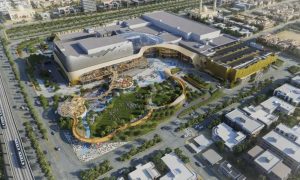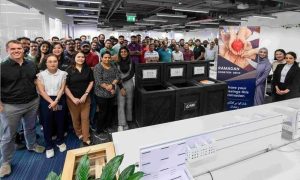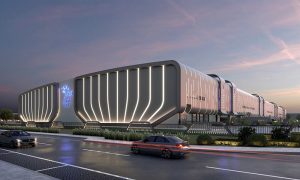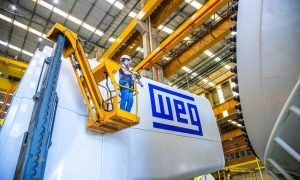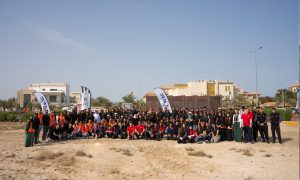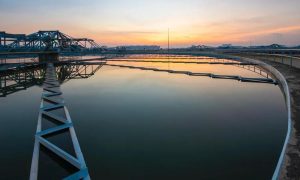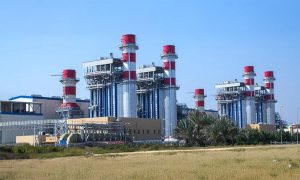Special Interview: The Perfect Fit
Big Project ME speaks to Rob Davies, managing director of depa Interiors, to find out how the fit-out specialist contractor plans to target the Saudi Arabian market

It is no secret that the Kingdom of Saudi Arabia is the GCC region’s biggest construction market and with the Kingdom refocusing its national economy in line with Vision 2030, there has recently been a strong emphasis on developing several high-profile hospitality, commercial, residential and retail construction projects across the country.
A by-product of this exponential growth is an unprecedented demand for interior and fit-out solutions in the Saudi Arabian marketplace.
Not only does this include hospitality-focused projects, but also takes in leisure destinations and institutional buildings and structures vital to the socio-economic landscape of the country.
According to Ventures Onsite, the interiors industry for the residential sector is valued at $3.6 billion, followed by hospitality with $2.1 billion, commercial real estate at $1.1 billion, retail at $872 million, hospitals at $410 million and education, at $339 million.
Due to the potential of the KSA market, specialist fit-out contractors and consultants are eying the lucrative space within the market with keen interest. One such company is the internationally renowned fit-out contractor, depa Interiors.
The Nasdaq Dubai-listed contractor has been a active participant in the Saudi Arabian interiors sector for many years, having been awarded the King Abdullah Petroleum Studies and Research Centre by Saudi Aramco in 2011. In fact, the company was picked by Zaha Hadid Architects for the project because of its capabilities, which include extensive BIM expertise and experience.
Not only has the company been operating successfully in Saudi Arabia, but it has also contributed extensively to the country’s construction industry, introducing several new technologies such as BIM 360 and maximising the use of the Internet of Things.
However, given the scale of operations in the Kingdom, depa Interiors has ramped up its focus on the country and despite the ongoing coronavirus pandemic engulfing the world and disrupting operations, the company is still banking on the Kingdom remaining the GCC’s most promising market.
“2020 got off to a great start with the award of five cinema projects, and more recently, the public areas of a five-star hotel project,” says Rob Davies, managing director of depa Interiors. “Our main focus this year was to break into the cinema market in KSA given the numerous opportunities there and the comparatively diminishing attractive opportunities within the Emirates.
“While there are some fantastic opportunities in the Emirates, the gains that can be achieved there have generally reduced considerably due to the stress within our competitors. This situation is further exacerbated by the number of contractors that are able to pay on time or at all. The challenges we face always revolve around cash collection. This remains a significant challenge, even for certified amounts.”
Davies adds that the current coronavirus pandemic could potentially exacerbate the situation, despite depa having had some success in collecting cash through the first quarter of this year. He also points out that the resolution of disputes has had an impact on the company’s KSA projects, as unfortunately, these issues take up a significant amount of resources to resolve and often distract from ongoing projects.
“Numerous projects suffered from delay in 2019 – probably more so than any other year. The issues we’ve faced have generally been those of access, being delayed by other trades, and changes late in finishing stages. While this has been a significant problem within the Emirates, it has had a knock-on effect on every project in Saudi Arabia, where we are now incurring costs to resolve these issues.
“That is why we have, over the first two months of 2020, established a discreet team within the KSA businesses so as to ensure that we have the correct people, with the correct experience, in place to successfully deliver the many cinema opportunities present in the Kingdom. This could be a sizeable proportion of KSA revenue over the coming years,” he explains.
Furthermore, Davies points out that there are numerous other significant projects that interest depa Interiors, such as the Red Sea Development, the reinvigorated KAFD and further opportunities on Riyadh Metro, where the fit-out contractor is working on two metro stations – KAFD Metro Station and Olaya Metro Station.
“depa have spent the last year talking to developers and project managers to ensure that we are well placed to secure the right projects that can deliver a reward commensurate with the risk. The importance of KSA is not simply short term – it has the opportunities to become a very significant part of our revenue stream,” he asserts.
“The entertainment and leisure sector is booming within KSA given the recent changes in Law. The pipeline of projects, with the developers with which we have relationships with, is significant enough that we have, as mentioned, formed a dedicated cinemas team. We are also building that cinema client base, and this will hopefully give us a healthy pipeline of work over the next few years.
“There are numerous opportunities, however the project values are relatively small and the programs aggressive. Hence the need for a dedicated team to ensure, to the extent possible, a continuous flow of work. Winning our first cinema contract of five individual projects spread across Saudi Arabia, comprising of 36 screens, a total contract value in excess of $110 million, with each project having a duration of no more than six months, is the culmination of more than six months of research and hard work by both the business development team and the estimation team, as well as with significant input from engineering.
He adds that while the project may look relatively straightforward, it is actually quite challenging and needs careful management as many of the screens are being constructed within live malls and include structural and MEP works.
“You then need to factor in a maximum duration of six months, including procurement, design work, construction, testing and commissioning. It’s no easy ride, especially when you consider there are multiple projects progressing in parallel.”
Furthermore, he points that working in Saudi Arabia has come with its own idiosyncratic challenges, which serve to highlight how different it is to its neighbour, the UAE. Chief amongst these differences is the fact that clients in the Kingdom tend not to, as a general rule, tender fit-out and other major packages as provisional sums, as is the norm in the Emirates.
Instead, projects are awarded to main contractors on a turnkey basis, which then limits the available amount of work a fitout contractor can do as many main contractors will look to break the work down into its constituent parts, he explains.
However, Davies admits that things are slowly changing, with a number of contractors beginning to award full fit-out packages, particularly for high-end projects.
“We also have KAFD, where we are looking at a number of prestigious offices and hotels. We’re targeting to secure two of these projects by the half year mark. These include high-end government offices and five-star hotels,” he says, though he admits that the award of these projects may be delayed due to the impact of coronavirus pandemic sweeping the globe.
“This may well cause us other issues as we have two hotel projects completing within the next two months and it would be nice to have an easy transition from one project to another. As usual, we will hope for the best, but plan for the worst!”
Having operated in Saudi Arabia for a number of years, Davies says depa is familiar with the nuances of the market, particularly with regards to sensitive issues such as Saudisation and the difficulty of getting Saudi residential permits.
Despite this, he believes that the main risk contractors will face when working in the Kingdom will be resource shortages, as he explains.
“Try to get a flight in on a Sunday morning. If you manage to get a seat, you will be surrounded by design and project management consultants. Assuming that all the projects go ahead, these will be followed by a wave of construction staff, a shortage of skilled labour, and potential price increases from specialist contractors.
“Having an established supply chain in KSA is key to delivery of high-end projects. Whilst this may seem like an obvious statement, when you compare the markets of Saudi Arabia and the UAE, the latter is far more established and understands the requirements of a world class finish. The Saudi market is not as established and requires far more attention and supervision to ensure that the finished product is acceptable,” he states, adding that with a number of luxury hospitality brands targeting the Kingdom, quality will need to increase dramatically.
He predicts that this will necessitate the transfer of employees, and their expertise, to work with key local subcontractors, and that the transfer of knowledge this would generates could help increase the quality of the finished products. He also adds that he believes companies may need to collaborate with suppliers from preferred supplier lists in the UAE, so that they can provide the level of services within the Kingdom.
As a company that fully embraces technology, depa Interiors is a rarity in the fit-out contractor world, given that it has extensive BIM capabilities and experience. Furthermore, the company is a passionate advocate for technology in the construction sphere, wholeheartedly endorsing tech that utilises the Internet of Things.
The company employs a highly skilled labour force and fully owns ten state-of-the-art manufacturing facilities that produce high-end joinery work, FF&E, metalwork, upholstery, stone and marble. Not only does this allow the contractor complete control over the quality of finishes, it also allows it to avoid delays due to failures in the supply chain.
This is a message that Davies is keen to preach in Saudi Arabia, where he says that main contractors struggle to understand the added value of turnkey fit-out contractors.
“Hopefully, we can steer the market away from the current prevailing norms. This is not simply the removal of scope gaps, but also the use of technology to ensure fully integrated shop drawings, and hence resolve buildability issues prior to us arriving on site, while still ensuring world class quality.
“We have an engineering department consisting of more than 100 engineers, we’re market leaders in BIM and are also currently researching VR technology. We have seen successes recently with new technology introduced into our factories, which monitor exactly labour and wastage costs, that provide almost real time cost information and exact information for estimation and understanding of our cost base,” he says.
Despite all of this, Davies admits that the spectre looming over the entire industry is the coronavirus pandemic. Liquidity remains a significant issue for the construction sector, just as it has been for the last few years, and he predicts that the current crisis will have a considerable impact across the board.
“Payments from employers to contractors have often been flexed and the contractors, many of whom are in a distressed state, will experience a tough and bleak short-term future. The unknown has a much greater negative effect than that of bad news, and it seems like the unknown will prevail for some months to come.
“The coronavirus is already affecting the construction industry, and the prime issue is that of uncertainty and the extent and duration of the ultimate impact. To date, we have projects temporarily closed, bus passenger restrictions and staff numbers reduced and rotated to ensure business continuity. However, employee safety must come first, and where we assess the risk is untenable, we have little to no choice but to suspend work.
“This uncertainty and disruption will continue for some months, while another impact of the virus will be the effect on the delivery of materials from overseas. Italy provides a lot of stone, ceramics and veneers that we use. They have suffered terribly with the coronavirus and this will have an obvious effect. Add in Spain, Germany and Portugal and the extent of the problem starts to become evident.
“Firstly, on the purchase orders or subcontracts that have already been placed, and – as we’re seeing now – the increased costs of general products from China, such as MDF, as they take advantage of supply problems across Europe,” he states, adding that there are also likely to be contractual issues, delays and disruptions, all of which raise questions about how to best resolve these issues from a legal standpoint.
“These type of questions and disputes may take years to resolve, during which time the main contractors and their supply chains will have no choice but to suffer the additional costs. The most distressing part over the coming months will be the social impact, however. Given the uncertain duration of the coronavirus, companies will do all they can to survive. This will undoubtedly include the reduction or discounting of salaries, unpaid leave and numerous redundancies with little or no chance of finding future employment quickly. Uncertainty is, by far, going to be the biggest problem,” he concludes sombrely.




